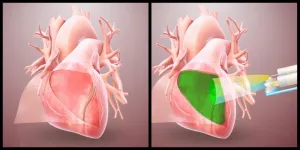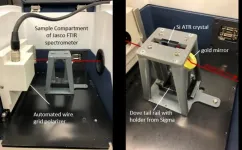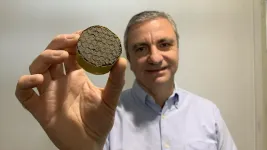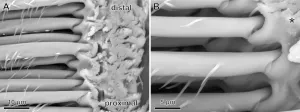mRNA vaccine yields full protection against malaria in mice
Recent advancements allow for novel approaches against an old enemy
2021-06-18
(Press-News.org) Scientists from the Walter Reed Army Institute of Research and Naval Medical Research Center partnered with researchers at the University of Pennsylvania and Acuitas Therapeutics to develop a novel vaccine based on mRNA technology that protects against malaria in animal models, publishing their findings in npj Vaccines.
In 2019, there were an estimated 229 million cases of malaria and 409,000 deaths globally, creating an extraordinary cost in terms of human morbidity, mortality, economic burden, and regional social stability. Worldwide, Plasmodium falciparum is the parasite species which causes the vast majority of deaths. Those at highest risk of severe disease include pregnant women, children and malaria naïve travelers. Malaria countermeasures development has historically been a priority research area for the Department of Defense as the disease remains a top threat to U.S. military forces deployed to endemic regions.
A safe, effective malaria vaccine has long been an elusive target for scientists. The most advanced malaria vaccine is RTS,S, a first-generation product developed in partnership with WRAIR. RTS,S is based on the circumsporozoite protein of P. falciparum, the most dangerous and widespread species of malaria parasite. While RTS,S is an impactful countermeasure in the fight against malaria, field studies have revealed limited sterile efficacy and duration of protection. The limitations associated with RTS,S and other first-generation malaria vaccines have led scientists to evaluate new platforms and second-generation approaches for malaria vaccines.
"Recent successes with vaccines against COVID-19 highlight the advantages of mRNA-based platforms--notably highly targeted design, flexible and rapid manufacturing and ability to promote strong immune responses in a manner not yet explored," said Dr. Evelina Angov, a researcher at WRAIR's Malaria Biologics Branch and senior author on the paper. "Our goal is to translate those advances to a safe, effective vaccine against malaria."
Like RTS,S, the vaccine relies on P. falciparum's circumsporozoite protein to elicit an immune response. However, rather than administering a version of the protein directly, this approach uses mRNA--accompanied by a lipid nanoparticle which protects from premature degradation and helps stimulate the immune system-- to prompt cells to code for circumsporozoite protein themselves. Those proteins then trigger a protective response against malaria but cannot actually cause infection.
"Our vaccine achieved high levels of protection against malaria infection in mice," said Katherine Mallory, a WRAIR researcher at the time of the article's submission and lead author on the paper. "While more work remains before clinical testing, these results are an encouraging sign that an effective, mRNA-based malaria vaccine is achievable."
INFORMATION:
Research was conducted under an approved animal use protocol in an AAALAC International- accredited facility in compliance with the Animal Welfare Act and other federal statutes and regulations relating to animals and experiments involving animals and adheres to principles stated in the Guide for the Care and Use of Laboratory Animals, NRC Publication, 2011 edition.
About the Walter Reed Army Institute of Research
Headquartered in Silver Spring, Maryland, the Walter Reed Army Institute of Research is the oldest and most mission diverse biomedical research laboratory in the Department of Defense. WRAIR provides unique research capabilities and innovative solutions to a range of force health and readiness challenges currently facing U.S. Service Members, along with threats anticipated during future operations. With comprehensive research units in Africa, Asia, and the Caucasus region, WRAIR houses three centers, the Center for Infectious Disease Research, the Center for Military Psychiatry and Neuroscience and the Center for Enabling Capabilities.
ELSE PRESS RELEASES FROM THIS DATE:
2021-06-18
A staged alert system, designed by scientists and public health officials to guide local policies, helped one city prevent hospital surges and long lockdowns, according to new research published in the journal Nature Communications.
In a new study led by The University of Texas at Austin COVID-19 Modeling Consortium in collaboration with Northwestern University, researchers describe the system that has guided COVID-19 policies in Austin, Texas, for more than a year, helping to safeguard the health care system and avoid costly measures. It tracks the number of new daily COVID-19 hospital admissions and triggers changes in guidance when admissions cross specific threshold values. While using this staged alert system, the Austin metropolitan area has sustained the ...
2021-06-18
A hydrogel that forms a barrier to keep heart tissue from adhering to surrounding tissue after surgery was developed and successfully tested in rodents by a team of University of California San Diego researchers. The team of engineers, scientists and physicians also conducted a pilot study on porcine hearts, with promising results.
They describe their work in the June 18, 2021 issue of Nature Communications.
In rats, the hydrogel prevented the formation of adhesions altogether. In a small pilot study, porcine hearts treated with the hydrogel experienced less severe adhesions that were easier to remove. In addition, the hydrogel did not appear to cause chronic inflammation.
Adhesions--organ tissue sticking to surrounding tissue--are a relatively ...
2021-06-18
"Any problem can be solved with a little ingenuity". While they may not be the originators of this quote, recent work from researchers at Osaka Prefecture University into understanding the molecular orientation of hybrid thin-film material is a concrete example of its central message. "We wanted everyone to have access to this knowledge," states research lead Professor Masahide Takahashi of the OPU Graduate School of Engineering. Using laboratory-grade equipment with 3D printable optical setups, his research group has established an easy, versatile, yet highly sensitive approach ...
2021-06-18
Sophia Antipolis - 18 June 2021: A small feasibility study has suggested that tai chi has the potential to reduce depression, anxiety and stress plus improve sleep in people who have had a stroke. The research is presented today at EuroHeartCare - ACNAP Congress 2021, an online scientific congress of the European Society of Cardiology (ESC).1
Depression occurs in approximately one-third of stroke survivors and is linked with greater disability and mortality rates.2,3 Individuals with post-stroke depression frequently also report anxiety, stress, and poor sleep.4-6
Tai chi focuses on releasing tension in the body, incorporating mindfulness and imagery into movement, increasing awareness and efficiency of breathing, and promoting overall relaxation of body and mind.
"Mind-body ...
2021-06-18
While postpartum depression in new mothers is well recognized and known to increase if the newborn requires intensive care, depression in new fathers has not received much attention. A large study, published in the journal Pediatrics, found that both parents with a baby in the NICU are at risk, with depression symptoms identified in 33 percent of mothers and 17 percent of fathers. Strikingly, the probability of reporting depression symptoms declined significantly for mothers but not for fathers after the baby came home.
"Our findings point to the need for increased attention to the mental health of new fathers, during their baby's NICU stay and after discharge," said lead author Craig F. ...
2021-06-18
An incredibly light new material that can reduce aircraft engine noise and improve passenger comfort has been developed at the University of Bath.
The graphene oxide-polyvinyl alcohol aerogel weighs just 2.1kg per cubic metre, making it the lightest sound insulation ever manufactured. It could be used as insulation within aircraft engines to reduce noise by up to 16 decibels - reducing the 105-decibel roar of a jet engine taking off to a sound closer to that of a hair-dryer.
The aerogel's meringue-like structure makes it extremely light, meaning it could act as an insulator within aircraft engine nacelles, with almost no increase ...
2021-06-18
Just how do spiders walk straight up -- and even upside-down across -- so many different types of surfaces? Answering this question could open up new opportunities for creating powerful, yet reversible, bioinspired adhesives. Scientists have been working to better understand spider feet for the past several decades. Now, a new study in END ...
2021-06-18
Researchers from Colorado State University, Amazon, and Dartmouth College published a new paper in the Journal of Marketing that examines the role of physical stores for selling "deep" products.
The study, forthcoming in the Journal of Marketing, is titled "How Physical Stores Enhance Customer Value: The Importance of Product Inspection Depth" and is authored by Jonathan Zhang, Chunwei Chang, and Scott Neslin.
While some traditional offline retailers are struggling and are closing stores (e.g., Macy's, Walgreens), online retailers are opening them (e.g., Amazon, Warby Parker). This conflicting trend ...
2021-06-18
June 17, 2021, Nutley, NJ - During two months at the height of the first wave of COVID-19, Hackensack Meridian Health experts helped find the best way to triage and prioritize necessary surgeries across the health network. Their work allowed the system to keep up with crucial care - and it may help point the way forward in case of future emergencies.
The health network experts implemented the medically necessary time sensitive (MeNTS) surgical scoring system developed by the University of Chicago to triage the case load across the health system, the largest in New Jersey. The results are published now in The American Journal of Surgery, and the lead author is a medical student at the Hackensack Meridian School of Medicine.
"This is critical work and it shows how important teamwork ...
2021-06-18
Over the past three decades, fundamental groundwork for building quantum computers has been pioneered at the University of Innsbruck, Austria. As part of the EU Flagship Quantum Technologies, researchers at the Department of Experimental Physics in Innsbruck have now built a demonstrator for a compact ion trap quantum computer. "Our quantum computing experiments usually fill 30- to 50-square-meter laboratories," says Thomas Monz of the University of Innsbruck. "We were now looking to fit the technologies developed here in Innsbruck into the smallest possible space while meeting standards commonly used in industry." The new device aims to show that quantum computers will soon be ready for use in data centers. "We were able to show that ...
LAST 30 PRESS RELEASES:
[Press-News.org] mRNA vaccine yields full protection against malaria in mice
Recent advancements allow for novel approaches against an old enemy





